by Amy Plano | Jul 9, 2018 | metabolism, weight loss
What is metabolic testing ?
The million dollar question on everyone’s mind, “what is metabolic testing ?” Many people have heard the term but have no clue what to expect from metabolic testing. The goal of this blog is to clarify this information and tell you exactly how to prepare for the testing to ensure the best results.
Trust me – there is absolutely nothing remotely scary about having your metabolism tested. In fact – I can almost guarantee you will be skipping out of my office with the new information in hand like a kid on Christmas day. Now let’s chat about how to prepare for metabolism testing.
First things first, metabolism testing does not hurt. I promise! We don’t draw blood. Also there is NO physical exertion involved. In the past, I have had patients show up in their workout gear thinking they were going to participate in something that might resemble a stress test. This is certainly not the case. So no worries you can leave your running shoes at home!
The device we use to measure your metabolism is called the Bodygem. This device measures your metabolism by capturing the air you breath.
Sounds pretty easy? Well it is.

Three things to do to prepare for the metabolism test:
Come fasted with no caffeine in your system for 4 hours prior to your test. You can drink plenty of water though!
Please don’t exercise within 4 hours of the test.
Arrive not having smoked a cigarette within 4 hours of the test.
Caffeine, exercise, and nicotine all can slightly increase your metabolic rate. Therefore, we do our best to minimize these variables so we can deliver you the most accurate results.
Curious about what other factors might influence your metabolism? Check out last week’s informative blog “RMR Testing 101” on this exact topic.
The actual test
Once you arrive we will get you all set up! You will sit peacefully in a chair with a small mouth tube in your mouth and a cute little nose clip on. The goal of the nose clip is to create a vacuum seal so no air escapes.
I promise, I will not post any Facebook pictures with your sexy nose clip on:)
By measuring both the amount of oxygen you exhale and the amount of carbon dioxide you expire we are able to calculate your metabolism. It’s that simple. This method is called indirect calorimetry and is one of the most accurate ways to measure metabolism. The test itself takes about 10 minutes.
Like I mentioned, the test does not hurt. However, some people find it uncomfortable as you need to breathe through your mouth for the duration of the test.
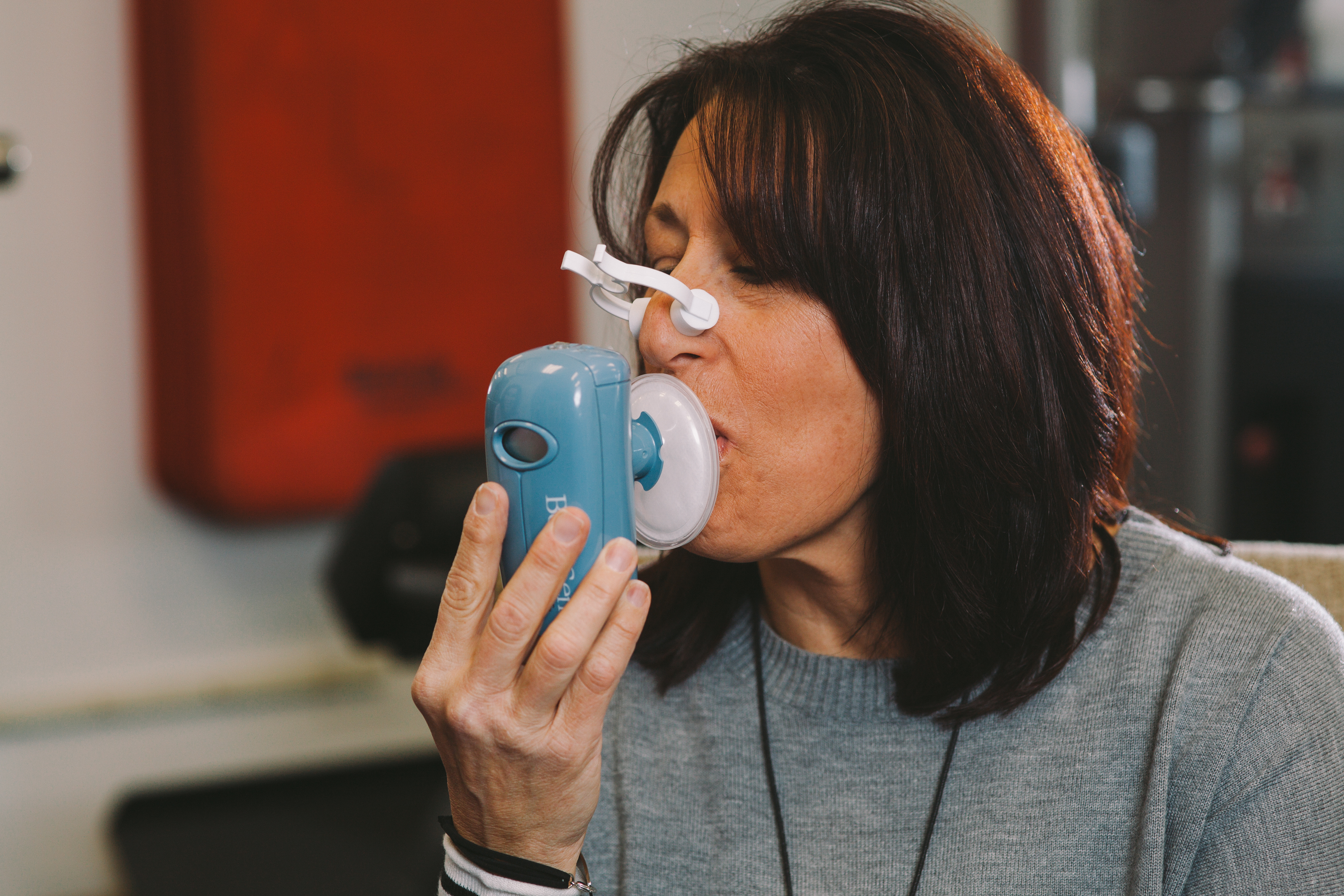
Once the test is complete we need to talk goals. Generally speaking my patients generally have three types of goals – they want to lose weight, maintain their weight or gain weight. Therefore, the next step will be tol weigh you and test your body fat. That way we have a starting point for you to gauge your progress.
Next, we will gather your demographics. Factors such as your age, sex, occupation, type and frequency of exercise, and even your sleep patterns are all important variables in determining an appropriate calorie level for your goals. All this information is then entered into a software program which then generates several important numbers.

The Bodygem tells us the following:
Exactly how many calories you need to take in on the days you workout
Exactly how many calories you need to take in on your non-training (rest) days.
How you compare to other individuals with the same demographics
Your BMI
Once we have this important information we can then specifically tell you where your calories need to be to accomplish your specific goals. We can also make suggestions on your macros if that is something you are interested in. If you need help setting up these numbers in a tracking program like MyfitnessPal we are happy to help guide you as well.
If you need additional services like a customized meal planner with specific meal suggestions or guidance on how to incorporate carbohydrate cycling or intermittent fasting these can all be provided at an additional fee.
The entire metabolic test plus the consult should take no longer than 45 minutes. You will leave with a personalized print out with your results and a solid knowledge of what is metabolic testing really entails. No guesswork involved!
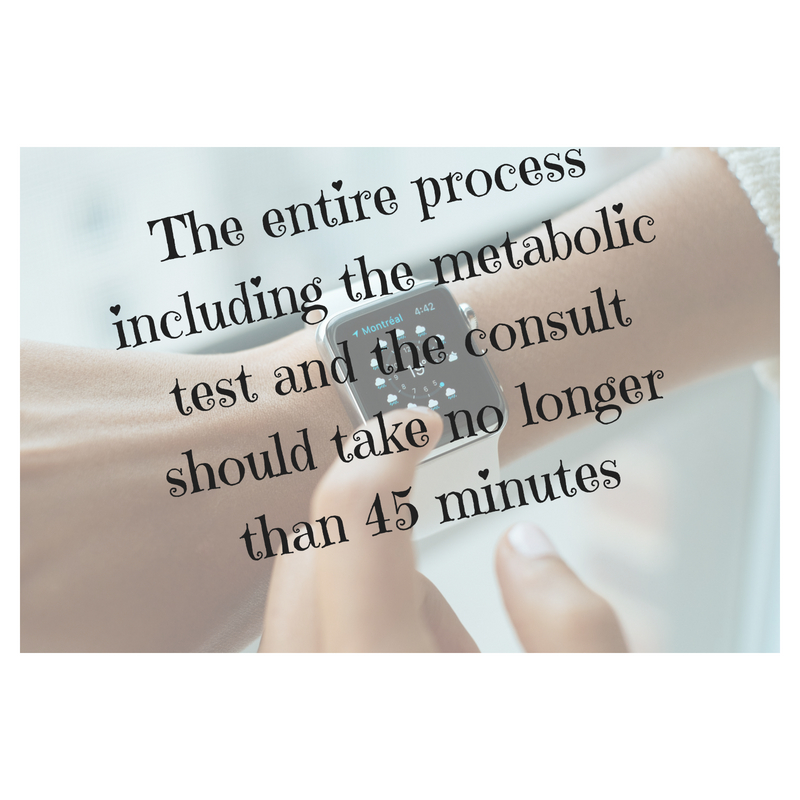
On next week’s blog we will dive deeper into the results. We will interpret the results of three actual Bodygem results and discuss how to apply the information. So now when someone asks you the question, ” what is metabolic testing ” you will be able to give them a A+ answer 🙂
P.S. The icing on the cake is if you purchase the metabolism test during the month of July you will be entitled to a 40 % discount for my birthday. Just use coupon code thisis40 when you schedule your metabolism test on www.amyplano.com to receive the discount. However, act fast as this discount will only be around until July 31, 2018.
Have questions on metabolic testing? Please don’t be shy! Ask in the comments section below.
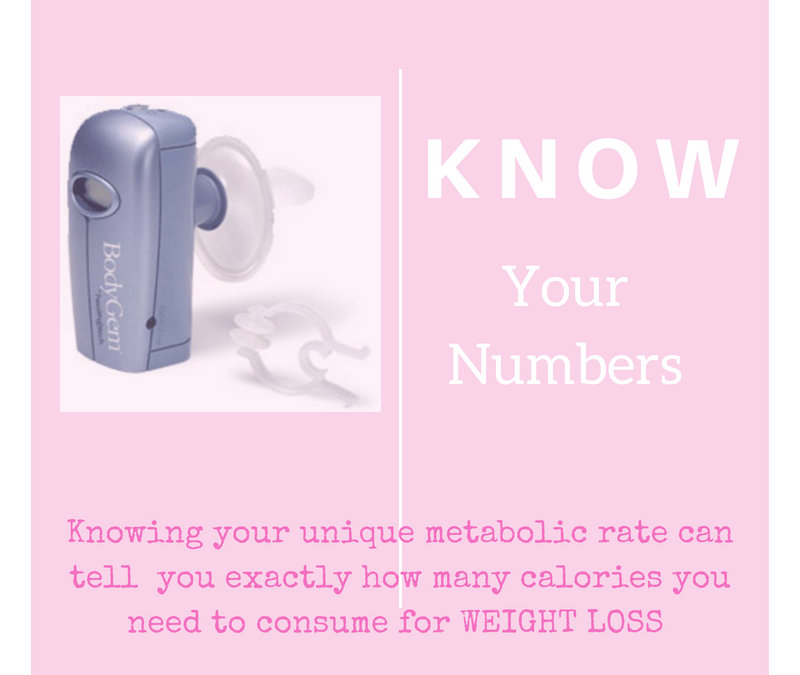
by Amy Plano | Jul 2, 2018 | metabolism, weight loss
Are you unable to lose weight in spite of vigorous exercise and a disciplined training schedule? Are you looking to maximize your performance yet feel like despite all your efforts you are failing miserably? Have you hit a plateau in your weight loss? Would you like to take the “guesswork” out of determining your calories to achieve your goals? Well if you answered “heck yes” to any of the above questions then you are likely the perfect candidate for RMR testing.
What is Metabolism
First things first, before we talk about RMR testing and why it is so friggin’ important we need to define metabolism. Did you know that even when you’re at rest, your body needs energy for its “silent” functions? These include breathing, circulating blood, adjusting hormone levels, and growing and repairing cells. The number of calories your body uses to carry out these basic functions is known as your basal metabolic rate (BMR) or more often referred to outside of a clinical setting as resting metabolic rate (RMR).
There are many factors which determine our metabolism. Some include:
Your body size and composition.
People who are larger or have more muscle burn more calories. Even at rest these folks tend to have higher RMR’s.
Your sex.
Men usually have less body fat and more muscle than do women of the same age and weight. This means men burn more calories at rest (Boo!). But don’t worry, I will be sharing some tips for how us chicks can optimize our metabolisms.
Your age.
As we get older (sigh), the amount of muscle we carry tends to decrease. Fat accounts for more of our weight, slowing down calorie burning. [Tip: If you consistently work out with weights you can help off-set some of this loss 🙂 ]
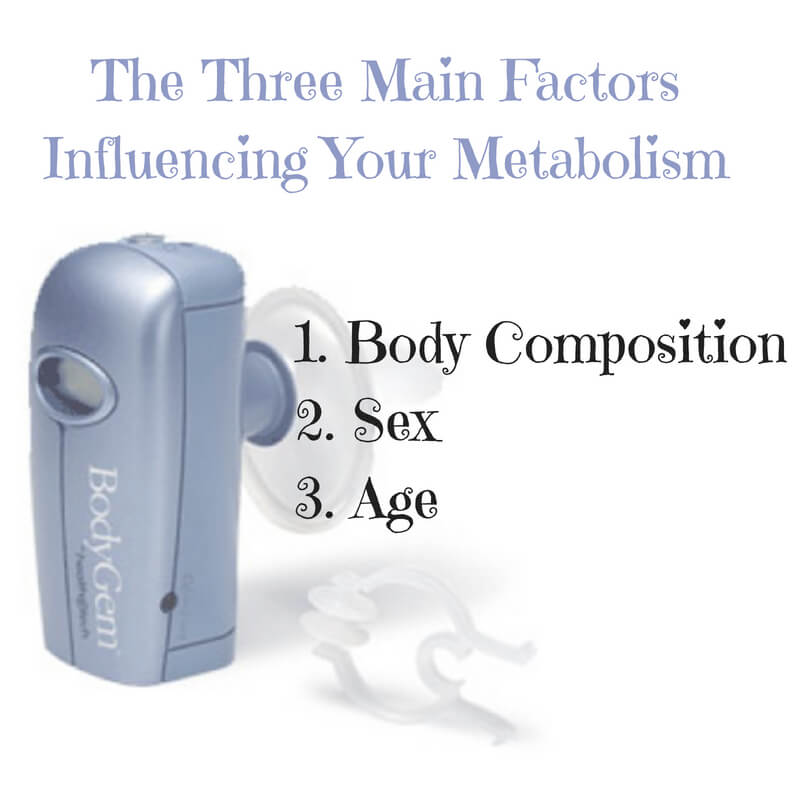
Two other important factors that determine how many calories your body burns each day:
Food processing (we call this thermogenesis!)
Did you know that digesting, absorbing, transporting and storing the food you consume also expends calories? Score! About 10 percent of the calories you burn each day come from the digestion and absorption of food and nutrients.
Physical activity
Physical activity and exercise accounts for the rest of the calories your body burns up each day. It comes as no surprise that physical activity is by far the most variable of all the factors.

The changes in overall body mass (increase or decrease) ultimately comes down to long-term energy balance which is represented by energy in (via food) and energy out (via metabolic rate). Total energy expenditure is determined by many factors including: body composition, sex, age, thermogenesis and physical activity. Having ‘good’ genetics certainly doesn’t hurt either! So now that you are a master of ‘all terms metabolism’ let’s get down to business.
Here are my top three reasons for why getting your RMR tested is SO important to achieving your body composition and training related goals
1. Takes the guesswork out.
By having your metabolism tested by a professional you never need to ask yourself the annoying questions, “How much or little should I be eating ?!?”
How many times have you entered your height and weight into an online metabolism calculator only to get some crazy number which you have no idea how to interpret?
I cannot tell you how many times patients come into my office following a calorie level that is completely wrong for the goals they are trying to accomplish. This frustrates the heck out of me. It’s not that they are unsuccessful for lack of trying. It’s simply because they have been provided with the wrong information.
By testing your RMR you will now know the exact number of calories your body needs to accomplish your dietary and fitness related goals. There is no more guessing or even second guessing where your calories need to be! Through the use cutting edge technology we can help you determine the exact amount of calories you need to reach your goals. Headache solved!
2. Gives you an accurate baseline.
If you don’t know your baseline calorie needs how do you know if what you are doing is ‘working’?
You have got big goals which I love and admire. However, how can you accomplish your long-term goals if you don’t know where your baseline needs currently are? Testing your metabolism before you make significant changes to your exercise and/or training routine can provide you with a solid foundation in which to make adaptations. Therefore, as things like your body composition, weight and/or performance markers change over time you can adjust your calories relative to your new goals.
Independent of what our specific goals are we all need a caloric starting point. If we don’t have a baseline and we start making changes to our diet how can we tell what specific calorie level is working? Simply put – we can’t.
Therefore, by testing your RMR before making any significant dietary and/ or training changes you are armed with an accurate, reliable calorie level to base your goals on.
3. It helps you when you are stumped.
Knowing your RMR gives you clarity in those moments when no matter how hard you try – you just cannot seem to tackle your dietary and/or fitness goals.
Knowing your your RMR can be critical when you are stumped. As mentioned previously many people base their goals around a calorie level that is not in tune with their goals. Along with the headache this creates can come a massive amount of frustration. Unfortunately, if you have been there you know exactly what I am talking about 🙁
Trying to gain lean muscle mass but struggling like crazy? It could be that your calories are too low. We all know that in order to build anything we need ‘extra’ resources, right? That extra might be money, resources or time. Same goes for putting on muscle. In this case, the extra needs to be in the form of calories. Therefore, for someone aiming to put on muscle they need to FIRST make sure they are taking in enough calories to do.
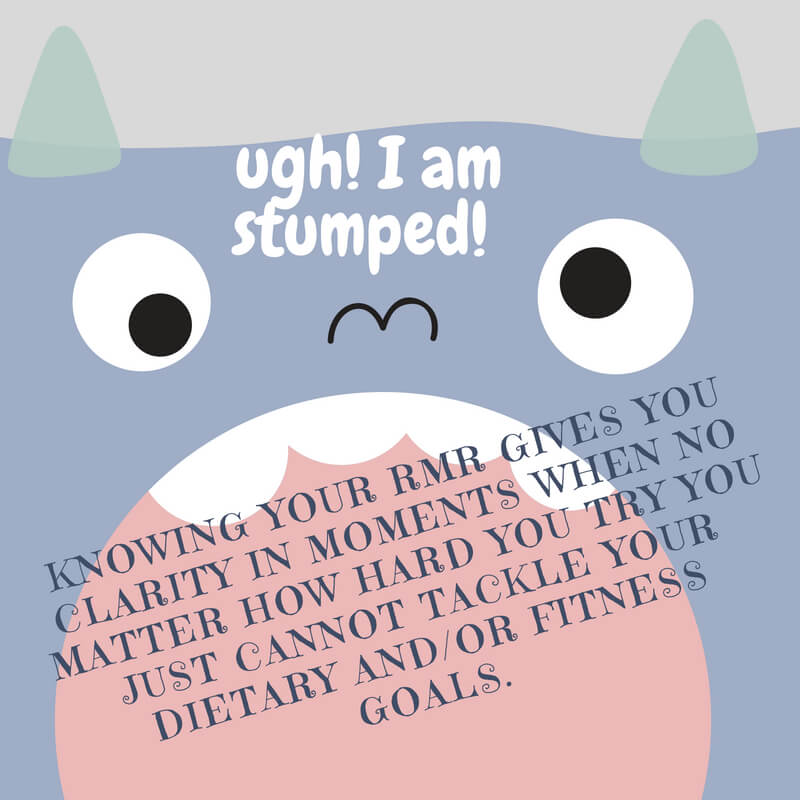
On the flip side, do you feel like you are at a weight loss plateau? Are you meticulously counting calories, carbs, protein and everything under the sun and still not losing weight? Is MyFitnessPal definitely not your pal? For most people the simple answer is their calories are not in tune with their weight loss goals. It could be that their calories are too low. Or it could mean that their calories are too high. How the heck will they know unless they actually test their metabolism?
Knowing your unique RMR for the different ‘seasons’ can help optimize your nutrition during both your off-season and peak training periods. During training, you need to make sure you are taking in enough calories to support not only your training but your ideal body composition for your sport. It’s no surprise when an athlete is not taking in enough calories how quickly they feel the side effects. Unintentional weight can lead to fatigue, burnout and injury. All of these can be factors can be minimized if not avoided entirely.
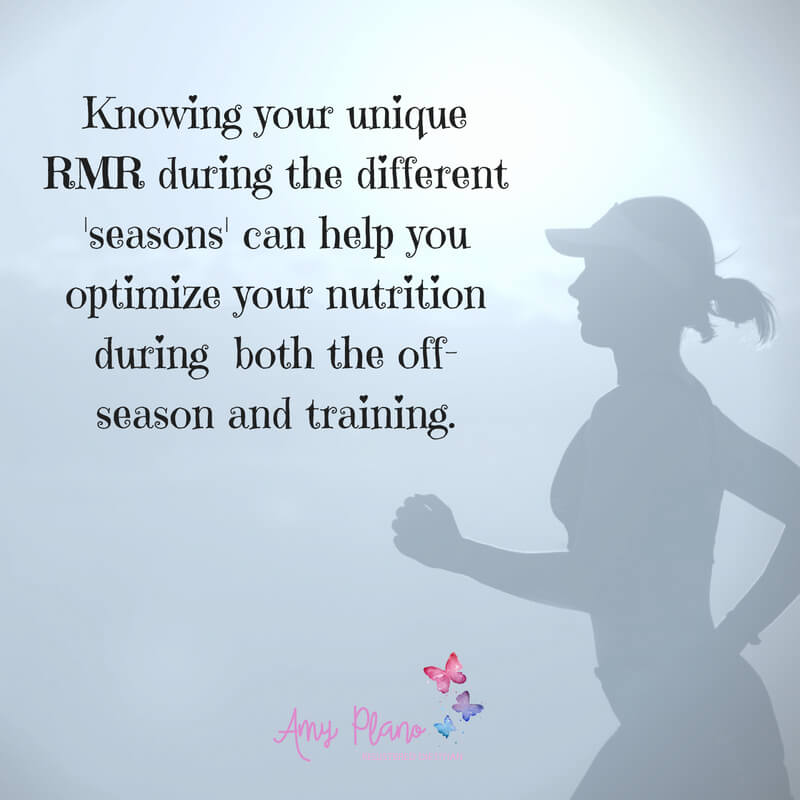
Leave nothing on the table when it comes to your training. Mama did not raise no fool 🙂
Case in point – I rest my case. Plain and simple – anyone with a performance or body composition related goal should have their metabolism tested. And truth be told I don’t know a whole lot of people who don’t share these goals (especially the later!) By testing your RMR you will no longer be ‘spinning your wheels.’ The precise tools you need to determine the exact calorie level to fit your specific goals is attainable. And just like Jim Rohn’s stated, “When you know what you want and you want it bad enough, you’ll find a way to get it.”
P.S. Did you know we are running a 40 % discount on RMR testing for the month of July? Use the coupon code thisis40 when scheduling your metabolism testing under the ‘appointments’ tab on our website www.amyplano.com
P.P.S. What are you waiting for? This fantastic deal will not be around forever. Cut through all the confusion and get the numbers you need.
P.P.P.S. Does any of this mumbo-jumbo about RMR testing resonate with YOU? If so, in what way? Share your thoughts in the comments below. We ♥ to hear your thoughts. Don’t be shy – we don’t bite.
by Amy Plano | Jun 25, 2018 | metabolism, weight loss
So it is true … this girl right here turns 40 years old on Friday, June 29th. And what better way to celebrate my 40th then with YOU my loyal readers. So how would you like to receive a present from me? How does a 40 % discount on a metabolism test to celebrate this fabulous occasion sound? I don’t know about you but it sounds pretty dang awesome to me.

Heading into the next decade can be a drag. So rather than have a pity party for myself I decided to give you a pretty sweet present to mark this milestone birthday – 40 % off metabolism testing for the whole month of July. Whoot! Whoot!
For the whole month of July redeem coupon code thisis40 when scheduling your metabolism test to receive 40 % off each individual test. The normal rate for a metabolism test is $150.00. Therefore, by redeeming the code thisis40 you save yourself 60 bucks! If that is not pretty sweet – then I don’t know what is.

Important note: In order to receive the most accurate reading on the metabolic test you should be fasted (no food), with no exercise or caffeine within 4 hours of your test time. You can drink plenty of water – just nothing with caffeine or calories.
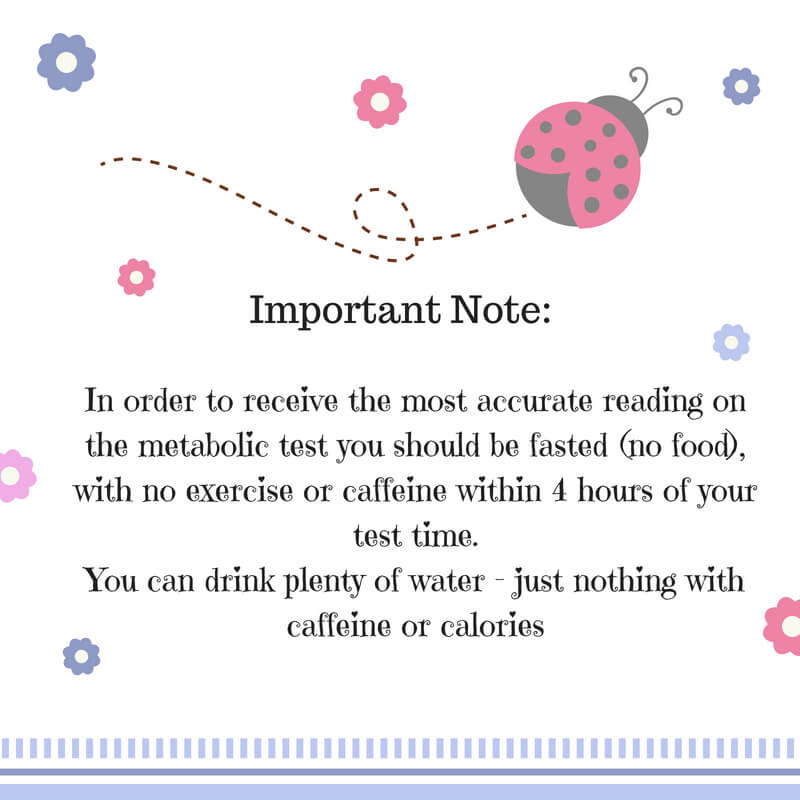
Below are the steps to redeem your discounted metabolism test:
- Click HERE and you will be re-directed to the scheduling section of this website.
- Click the link for “Metabolism Testing” under appointments.
- When the prompts ask you “with” who you would like to schedule you can choose either myself or my fabulous RD Audrey. The discount applies to us BOTH.
- Select the time slot you would like to come in for your metabolism test.
- Next put in your name, phone number and email address.
- Within the information section where it says “Redeem Coupon” put in the discount code thisis40
- Follow the prompts for payment
- Once you have provided payment you will receive an email confirmation with the date and time of your visit.
- Arrive fasted, with no caffeine or exercise within 4 hours of your test.
Our office is located at 500 Boston Post Road, Orange, CT 06477. We are in the same plaza as Hawley Lane Shoes. When you pull into the plaza look for signs for The Plano Program.
Over the next month I will be releasing more information about why having your metabolism tested is SO friggin’ important – so stay tuned for blog updates.
Please fee free to share this birthday gift with anyone who you think might benefit – which I think is pretty much anyone with nutrition related goals. After all who does not want to know their metabolism? Said no one ever 🙂
Have you ever had your metabolism tested? Did you find it helpful in reaching your nutrition related goals. Please tell us your experience in the comments below.












